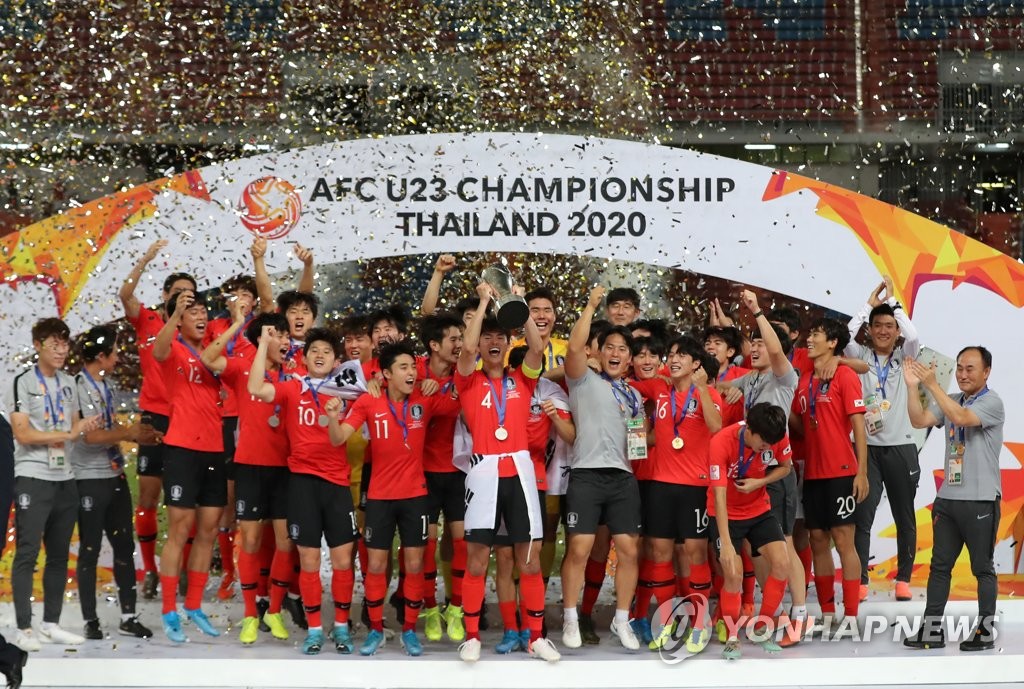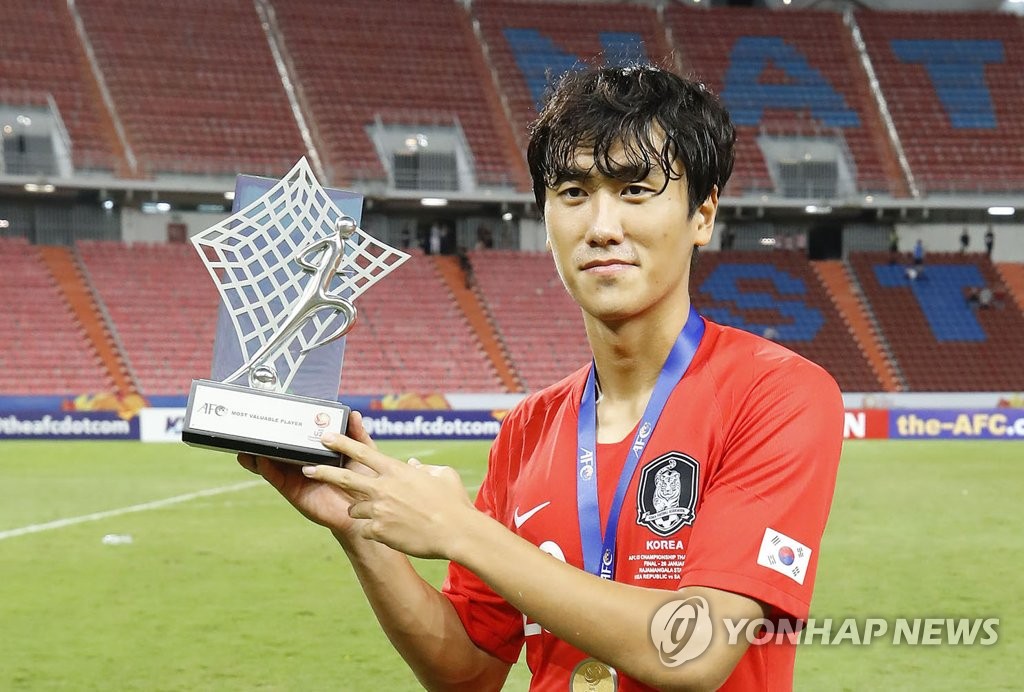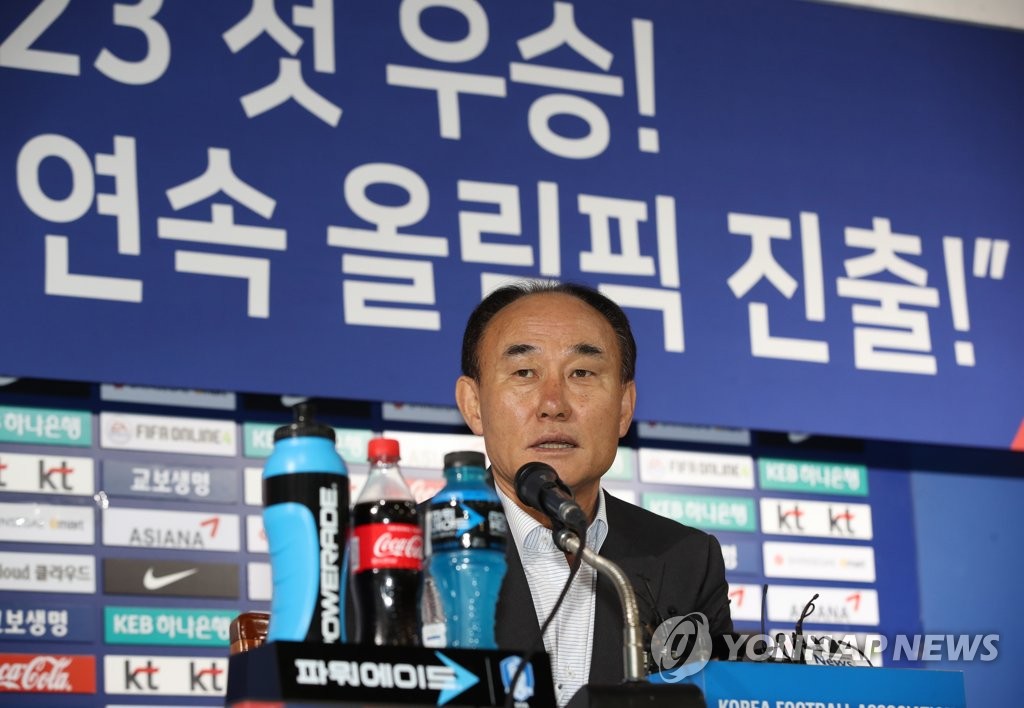- California Assembly OKs highest minimum wage in nation
- S. Korea unveils first graphic cigarette warnings
- US joins with South Korea, Japan in bid to deter North Korea
- LPGA golfer Chun In-gee finally back in action
- S. Korea won’t be top seed in final World Cup qualification round
- US men’s soccer misses 2nd straight Olympics
- US back on track in qualifying with 4-0 win over Guatemala
- High-intensity workout injuries spawn cottage industry
- CDC expands range of Zika mosquitoes into parts of Northeast
- Who knew? ‘The Walking Dead’ is helping families connect
S. Korea coach welcomes FIFA’s recommendation to raise age limit in Olympic men’s football
South Korea on Monday welcomed a recent FIFA recommendation to raise the age limit for the Tokyo Olympic men’s football tournament, saying players who were eligible in 2020 deserve a chance to compete at the Summer Games postponed by one year.
The Olympic men’s football is only open to players who are 23 or younger, except for a maximum three overage players permitted for each nation. For the 2020 Tokyo Olympics, those born on or after Jan. 1, 1997, would have been eligible.



In this file photo from Jan. 26, 2020, South Korean players and coaches celebrate winning the Asian Football Confederation (AFC) U-23 Championship over Saudi Arabia at Rajamangala Stadium in Bangkok. (Yonhap)
But with the Tokyo Games having been pushed to July 2021 due to the coronavirus pandemic, players born in 1997 wouldn’t be allowed to play unless the age limit was adjusted.
Last weekend, a working group established by FIFA recommended that the Tokyo Olympics should remain open to the 1997 births, as originally planned.
This recommendation still has to be approved by the FIFA Bureau, a reduced version of its decision-making Council. But the South Korean under-23 head coach Kim Hak-bum was still grateful that the door has at least opened a bit for his current squad.
“The players born in 1997 did so much work in securing the Olympic berth, and it would have been disappointing if they didn’t get a chance to play in the Olympics,” Kim said in a statement released by the Korea Football Association (KFA). “We’re lucky that these players will have their opportunity.”
On March 26, the KFA sent a letter to the Asian Football Confederation (AFC), which was also forwarded to the International Olympic Committee (IOC) and FIFA, and argued that it would be “unfair” for 1997-born players not to be able to compete at the Olympics after the event was postponed for reasons outside their control.
When South Korea won the Asian Olympic qualifying tournament, the AFC U-23 Championship, in January this year, Kim relied heavily on 11 players born in 1997.
The group includes the tournament MVP Won Du-jae, who excelled as a shutdown midfielder. Song Bum-keun, named the best goalkeeper of the competition, was also born in 1997, as were Lee Dong-gyeong and Lee Dong-jun, who tied for the team lead with two goals apiece.
Coach Kim insisted as important as the rule change is, no 1997-born player will be guaranteed a spot on his team.
“(The recommendation) doesn’t change the fact that the players have to earn their places on the team,” Kim said. “And everyone will have the same opportunity.”
The Olympic eligibility is of particular importance for South Korean male athletes, because of the country’s mandatory military service.
Winning an Olympic medal of any color exempts South Korean male athletes from military duties. For football players in their early 20s with aspirations of moving to major European leagues or carving out long domestic careers, a two-year military service disruption could cost them millions in earnings or, short of such lucrative deals, stability and security.
The under-23 age cap was first put in place for the 1992 Barcelona Olympics. South Korea have played in every Olympics since then, a span of seven tournaments, and captured the bronze medal in London in 2012. That remains the country’s only medal in Olympic football.








![일본 사도광산 [서경덕 교수 제공. 재판매 및 DB 금지]](http://www.koreatimesus.com/wp-content/uploads/2024/07/PYH2024072610800050400_P4-copy-120x134.jpg)


